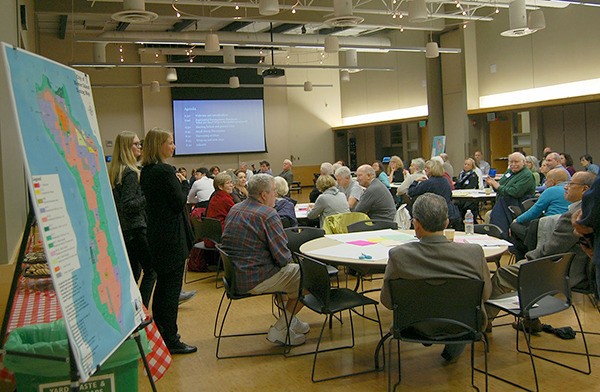About 60 people — including developers, concerned citizens, city staffers and members of the Mercer Island City Council and Planning Commission — gathered last Wednesday to discuss residential development in single-family neighborhoods.
The goal was to hear concerns, define the problem and come up with ideas to solve it, said Scott Greenberg, the city’s Development Services Group (DSG) director. The city has so far identified the issue as “the rapidly changing character of Mercer Island’s neighborhoods,” referencing recent trends of teardowns and subdivisions. Older, smaller and more affordable homes are more frequently being replaced by larger, or multiple, houses.
A review of Mercer Island’s residential development standards has been on the council’s work plan for several years, but after hearing a variety of concerns from many residents about new home construction and wrapping up other planning processes, including the Comprehensive Plan update and Town Center vision, it will be one of the top priorities in 2017.
Over the next few months, the Planning Commission will review the current code, gather public input and recommend code updates to the council. City staff advocated for a lengthier public process because the effect on community aesthetics, property values and the economics of future development on the Island reaches much farther than the Town Center. In both discussions, residents are bringing up similar concerns with building height, density and new buildings not “fitting in” with Mercer Island’s suburban, “village” feel.
The state Growth Management Act, which requires cities to accommodate certain growth targets, was cited as justification for increased density in Mercer Island’s downtown area. But many residents pointed out that much of growth in Mercer Island was zoned in single-family neighborhoods.
It’s a discussion that involves the head and the heart, city officials have noted, and residents are very passionate about the issues.
“It reminds me that neighborhoods are made up of people, as well as buildings,” Councilmember Jeff Sanderson noted at Wednesday’s meeting.
To lead the effort, the City Council allocated funds for DSG to hire a long-term planning manager. Evan Maxim, who has previously held planning positions at the cities of Issaquah and Sammamish, came on board over the summer.
Maxim said he wants to figure out what the biggest problem is with the new homes: Size? Placement on lots? Design?
The council already came up with a list of 17 items for additional study, including building height, gross floor area, lot coverage, setbacks, construction-related impacts, fence height deviations and short plats, to name a few.
Observing the rapid pace of development in his neighborhood of First Hill, Councilmember Dan Grausz proposed a moratorium on certain types of residential development, including subdivisions and lot coverage deviations, last November. It was ultimately rejected by the council majority, though the need to start the conversation was recognized.
Many First Hill residents, including Grausz, attended Wednesday’s meeting. It was intended to serve as a “kick-off” to better help DSG staff and the Planning Commission define their scope of work.
One First Hill resident referred to his neighborhood as “Ground Zero,” and said he lived in a “construction site, if not a war zone.” His main concern has been echoed by many Islanders: that old houses are being torn down, and new houses replacing them are two to three times the original size, and price.
According to the Seattle Times, Seattle sees one home teardown every day, on average. More houses have been demolished and replaced in the past 18 months than in the four previous years combined, according to property data. There have been 191 teardowns since 2006 in Mercer Island. The ratio in Seattle is about 28 teardowns per 10,000 residents. In Mercer Island, it’s 81.
Most neighbors said that they believed the new developments are “all legal,” but just don’t fit in, while others complained about illicit building practices. One commenter said that the city’s current code is fine, but that it is not enforced. Many cited issues with variances being consistently granted to builders, and noted that deviations from the code should be the exception, not the rule.
Other concerns were with tree retention, building on steep slopes and developers being “abusive” and “aggressive” in their pursuit of certain properties. Some ideas were to establish an incentive program for remodeling versus rebuilding, and start a registry for historic homes.
Some residents, especially those who commented on the Town Center vision, said they were concerned with the integrity of the process, as they felt that their concerns and ideas weren’t heard the last time around.
The council had a moratorium on the books as the city reviewed and revised the Town Center code, and some residents said that the residential moratorium should be revisited.
To find out more or learn how to get involved, see www.mercergov.org/Residential.


